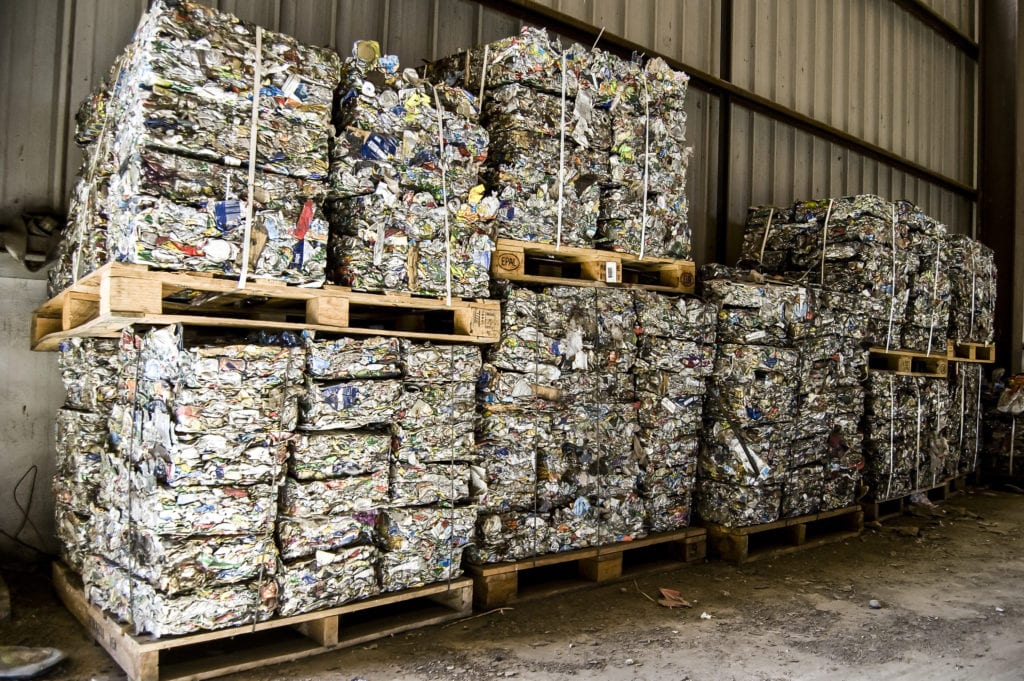In the current climate change crisis, businesses have an increasing responsibility to reduce their waste production and contribute to a greener world. However, for many businesses, this can be a daunting and alien concept if you have not previously been aware of business focused recycling processes. Collect & Recycle are here to help. Here are six ways your business could recycle more.
One: Recycle your shredded paper
Shredded paper makes up a large percentage of business waste, particularly those working with confidential information. Businesses are often reluctant to recycle shredded paper, for a number of reasons. Some businesses err on the side of caution regarding recycling confidential material. It seems safer to place shredded confidential material in the general waste, even when the initial aim of shredding was to eliminate the risk of information falling into the wrong hands! Another reason is that many recycling companies are cautious of accepting shredded paper as it can get caught in the machines, and is therefore fire hazard. That being said, businesses produce such a large amount of shredded paper that recycling it would have a huge impact on business waste. Collect & Recycle is a nationwide waste collection agency. With recycling centres throughout the UK, Collect & Recycle will safely and securely uplift your shredded paper and recycle it.
Two: Recycle your plastics
The prevalence of plastic waste in the UK and globally is the most pressing issue regarding waste disposal today. Businesses, particularly in the retail and hospitality sectors, are beginning to turn away from plastic packaging and tableware. However, outside of these sectors, most industries are still producing a great deal of plastic waste, and failing to recycle it effectively. Recycling your plastic not only reduces the amount that ends up in the landfill or the ocean, but it also reduces your company’s carbon footprint. Plastic Expert is the leading specialist recycling sector, tailored to business waste. They safely and efficiently dispose of plastic waste, while minimising or eliminating harm to the environment. They recycle many forms of plastic that mainstream recycling companies do not have the capacity to do. This includes LDPE, PVC, and Polystyrene foam.
Three: Recycle your hazardous waste
Hazardous waste is, unsurprisingly, very hazardous to human health and the environment. Hazardous waste includes any waste with a chemical compound that has a dangerous impact on human and environmental health. It is important to ensure that hazardous waste is disposed of effectively and safely, so that it does not enter the water supply. Many businesses do not know how to dispose of their hazardous chemical waste appropriately. Many are not, in fact, aware of the items that are included in this category. This includes not only solvents and used oil, but also batteries and used electronic equipment.
According to the Hazardous Waste Regulations of 2005, it is a criminal offence to dump unaudited and untreated hazardous waste. To ensure your hazardous waste is being disposed of correctly, hiring a verified chemical waste management company is crucial. Collect & Recycle have regulated and verified hazardous waste facilities across the UK designed to safely dispose of hazardous waste.
Four: Recycle your cardboard
Cardboard is the most well known recycled item in the UK. However, 7 million tonnes of cardboard gets sent to the landfill in the UK every year. Many businesses use cardboard as their main means of packaging, and thus excess cardboard waste is commonplace within many industries. Using a waste disposal company to manage this waste is crucial ensuring that excess cardboard does not build up and fill valuable space. Collect & Recycle has links to overseas paper mills. Their links with these mills demonstrates the most sustainable route for recycled packaging. Collect & Recycle also offers amazing rebates for cardboard bale collection.
Five: Why don’t you re-use?
Reusing your company’s waste is a great way to reduce your carbon footprint while also cutting costs of purchasing new raw materials. Here are a few materials that can be reused:
- Multiple forms of packaging
- Heat wasted during manufacturing processes. This can be captured and reused in heating or elsewhere in the production process
- Waste paper as notepaper
- Greywater recycling systems for your toilets


